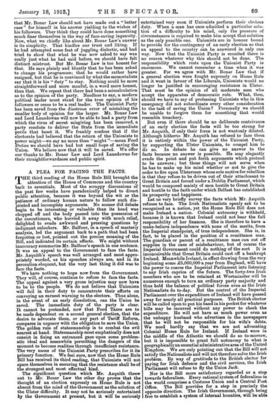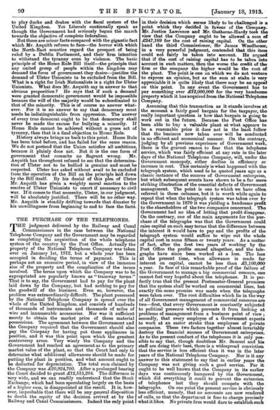A PLEA FOR FACING THE FACTS. T HE third reading of
the Home Rule Bill brought the attention of the House of Commons and the country back to essentials. Most of the scrappy discussions of the past few weeks have paradoxically helped to divert public attention, because it was beyond the wit or the patience of ordinary human nature to follow such disjointed and incomplete arguments. No sooner did debate begin to be interesting or valuable than its head was chopped off and the body passed into the possession of the executioners, who hurried it away with much relief, delighted to evade awkward and pressing questions by indignant onlookers. Mr. Balfour, in a speech of masterly analysis, led the argument back to a path that had been forgotten or lost, pointed out the precise meaning of the Bill, and indicated its certain effects. We might without inaccuracy summarize Mr. Balfour's speech in one sentence. It was an appeal to the Government to face the facts. Mr. Asquith's speech was -well arranged and most appropriately worded, as his speeches always are, and in its peroration eloquent, but the very last thing it did was to face the facts.
We have nothing to hope now from the Government. They will, of course, continue to refuse to face the facts. The appeal against a very gross injustice may now have to be to the people. We do not believe that Unionists -will fail in their duty to concentrate their efforts on conveying an earnest warning to the electors. Thus alone, in the event of an early dissolution, can the Union be saved. The immediate duty of the party is clear. It cannot be pretended, now that Food Taxes are to be made dependent on a second general election, that the desire to advocate them, or any part of Tariff Reform, compares in urgency with the obligation to save the Union. The golden rule of statesmanship is to combat the evil nearest at hand. Statesmanship most emphatically does not consist in fixing an entranced gaze upon some problematic ideal and meanwhile permitting the dangers of the moment to become realities through insufficient resistance. The very name of the Unionist Party prescribes for it its primary function. We feel sure, now that the Home Rule Bill has received its third reading, that Unionists will not spare themselves in ensuring that the resistance shall be of the strongest and most effectual kind.
The significant question which Mr. Asquith threw out to Mr. Bonar Law the other day proves that the thought of an election expressly on Home Rule is not absent from the mind of the Government as the solution of the Ulster difficulty. It may not be seriously entertained by the Government at present, but it will be seriously entertained very soon if Unionists perform their obvious duty. When a man has once admitted a particular solution of a difficulty to his mind, only the pressure of circumstances is required to make him accept that solution as the only possible one. Unionists are in honour bound to provide for the contingency of an early election so that an appeal to the country can be answered in only one way. Now that the Unionist Party is reunited there is no reason whatever why this should not be done. The responsibility which rests upon the Unionist Party is enormous. We cannot remember a time when it was greater. For we agree with Mr. Bonar Law that if a general election were fought expressly on Home Rule and it went in favour of the Liberals, Unionists would no longer be justified in encouraging resistance in Ulster. That must be the opinion of all moderate men who accept the apparatus of democratic rule. What, then, should we have to say of professing Unionists who in this emergency did not subordinate every other consideration to the task of saving the Union? Personally we should be unable to forgive them for something that would resemble treachery.
But even if there should be no deliberate contrivance of an early election the facts will be too strong for Mr. Asquith, if only their force is not wantonly diluted. Although hitherto Mr. Asquith has refused to face them it is entirely within the power of the Unionist Party, by supporting the Ulster Unionists, to compel him to do so. In debate he can give no answer to the facts because no answer is possible. He may elegantly evade the point and put forth arguments which pretend to be answers ; but these things will not serve when he has to make up his mind whether or not to give the order to fire upon Ulstermen whose sole motive for rebellion is that they refuse to be driven out of their attachment to Great Britain and forced under a Dublin Parliament, which would be composed mainly of men hostile to Great Britain and hostile to the faith under which Belfast has established. its prosperity and happiness.
Let us very briefly survey the facts which Mr. Asquith refuses to face. The Irish Nationalists openly ask to be recognized as a nation, yet the Home Rule Bill does not make Ireland a nation. Colonial autonomy is withheld, because it is known that Ireland could not bear the full responsibility of her finances. She is therefore to have a make-believe independence with none of the merits, from the Imperial standpoint, of true independence. She is, in fact, to be placed in the position of a remittance man. The guardian or parent of a remittance man can cut off supplies in the case of misbehaviour, but of course the Imperial Government could do nothing of the sort It is inconceivable that Great Britain could cast off a bankrupt Ireland. Meanwhile Ireland, in effect drawing from the very beginning some £5,000,000 a year from England, will have the power to coerce the Imperial Parliament into listening to any Irish caprice of the future. The forty-two Irish members who are to be retained at Westminster will be numerous enough to turn an ordinary party majority and thus hold the balance of political forces even as the Irish Nationalists do to-day. But the control of the Imperial Parliament over the expenditure of Ireland will have passed. away for nearly all practical purposes. The British elector will be called upon to put his hand in his pocket for whatever bills may be incurred without any power to check the expenditure. He will not have as much power even as the unhappy husband who advertises in the newspapers that he will not be responsible for his wife's debts. We need hardly say that we are not advocating Colonial Home Rule for Ireland. If Ireland were in the middle of the Atlantic we should do so to-morrow, but it is impossible to grant full autonomy to what is geographically an essential administrative area of the United Kingdom. We are only pointing out that the Bill will not satisfy the Nationalists and will not therefore solve the Irish problem. By way of gratitude to the British elector for paying for Irish defence and the civil services, the Irish Parliament will refuse to fly the Union Jack.
Nor is the Bill more satisfactory regarded as a step towards federalism. Every rational system of federalism in the world comprises a Customs Union and a Central Post Office. The Bill provides for a step in precisely the opposite direction. The Irish Government, through being free to establish a system of internal bounties, will be able
to play ducks and drakes with the fiscal system of the United Kingdom. Yet Liberals continually speak as though the Government had seriously begun the march towards the objective of complete federalism. But these are minor facts compared with the gigantic fact which Mr. Asquith refuses to face—the horror with which the North-East counties regard the prospect of being ruled by a Dublin Parliament, and their firm intention to withstand the tyranny even by violence. The basic principle of the Home Rule Bill itself—the principle that any united group of people within the kingdom may demand the form of government they desire—justifies the demand of Ulster Unionists to be excluded from the Bill. What is a right for Irish Nationalists is a right for Ulster Unionists. What does Mr. Asquith say in answer to that obvious proposition ? He says that if such a demand were granted democratic government would be impossible because the will of the majority would be subordinated to that of the minority. This is of course no answer whatever. For it is no answer to say that democracy must needs be indistinguishable from oppression. The answer of every true democrat ought to be that democracy shall never be made the excuse for bullying a minority. If Home Rule cannot be achieved without a gross act of tyranny, then that is a final objection to Home Rule.
History always brings us back to this point. Home Rule has been tried before, and has failed for the same reason. We do not pretend that the Union satisfies all ambitions, because it plainly does not. But it is the one form of government that commits no flagrant wrong. Mr. Asquith has throughout refused to see that the determination of Ulster not to be bullied is genuine and must be respected. Ulster has asked without avail to be excluded from the operation of the Bill on the principle laid down by the Bill itself. By his denial of this plea of Ulster Mr. Asquith has given a weighty moral sanction to the resolve of Ulster Unionists to resort if necessary to civil war. If it comes to that necessity, Ulster, in our judgment, will be absolutely justified. There will be no other way. Mr. Asquith is steadily drifting towards that disaster by his unwillingness from beginning to end to face the facts.







































 Previous page
Previous page